| Article ID | Journal | Published Year | Pages | File Type |
|---|---|---|---|---|
| 11025220 | Neuroscience | 2018 | 38 Pages |
Abstract
It is generally believed that oxidative stress and neuroinflammation are implicated in the pathogenesis of Parkinson's disease (PD). Reduced nicotinamide adenine dinucleotide phosphate (NADPH) has been demonstrated to have potent neuroprotective effects against oxidative stress. In the present research, we investigated if NADPH could offer neuroprotection by inhibiting glia-mediated neuroinflammation induced by 1-methyl-4-phenyl-1,2,3,6-tetrahydropyridine (MPTP), a mechanism contributing to PD pathogenesis. The current data demonstrated that MPTP/MPP+ increased levels of reactive oxygen species (ROS), activated glial cells, and inflammasome proteins in the substantia nigra (SNpc), in addition to inducing the nuclear translocation of nuclear factor-κB (NF-κB) and phosphorylation of p38 MAPK. These responses were inhibited by supplementation of exogenous NADPH. Moreover, NADPH effectively decreased MPP+-induced excessive production of ROS, p38 phosphorylation and inflammatory protein of Cyclooxygenase2 (COX2) in cultured microglial BV-2 cells in vitro studies. Similarly, the p38 MAPK inhibitor SB203580 suppressed the upregulation of MPP+-induced p38 phosphorylation and COX2 protein levels. Co-culture of neuronal cells with MPP+-primed BV-2 cells increased the levels of tumor necrosis factor-alpha (TNF-α) and induced cell death of neuronal cells. These effects were diminished by TNF-α neutralizing antibody and NADPH. NADPH reduced motor dysfunction and the loss of dopaminergic (DA) cells induced by MPTP. Therefore, the present study demonstrates that NADPH protects DA neurons by inhibiting oxidative stress and glia-mediated neuroinflammation both in vitro and in vivo, thus suggesting a potential of clinical application for PD and other neurodegenerative diseases.
Keywords
Related Topics
Life Sciences
Neuroscience
Neuroscience (General)
Authors
Ying Zhou, Junchao Wu, Rui Sheng, Mei Li, Yan Wang, Rong Han, Feng Han, Zhong Chen, Zheng-Hong Qin,
